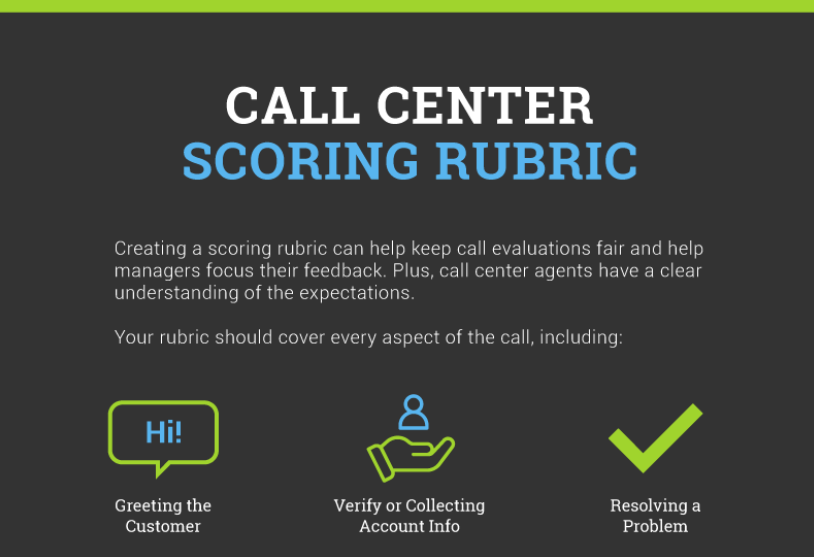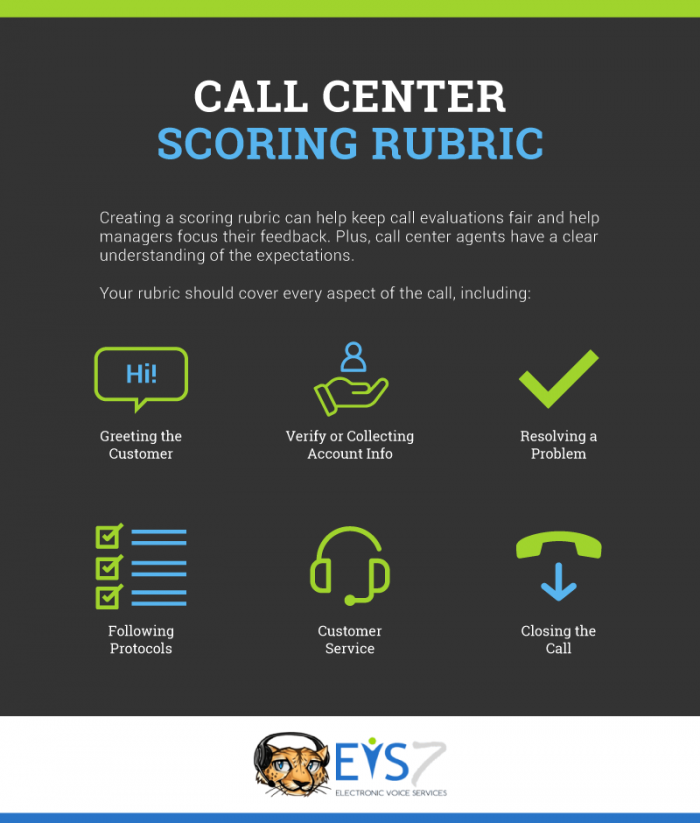22 Oct

Are you in charge of a call center? If you are, you’re probably constantly on the lookout for information that will teach you how to improve call quality in your call center. One of the best ways you can improve call quality is by learning to provide effective, meaningful feedback to your call center agents.
Too often, feedback isn’t fun to receive — or deliver. Providing feedback doesn’t have to be something you or your agents dread, however. Instead, giving and getting feedback should be something you and your agents look forward to because it will drive all of you toward common goals: improved call quality and better overall and individual performance.
Call Center Coaching
Some call center coaching styles make it difficult for managers to deliver effective feedback that will create lasting changes in an employee’s behavior. If your style is to give feedback in the form of a compliment that’s followed by a criticism and then another compliment, for instance, it may make it easier for you to deliver your message, but your style may dilute or even negate your message entirely.

Call Center Agent Coaching Techniques
If your coaching style isn’t inspiring your agents to make the changes they need to make to improve their performance, there are some call center agent coaching techniques you can employ to make your feedback more meaningful. To provide effective feedback for your call center agents, consider incorporating the following techniques into your coaching style:
1. Provide Timely Feedback on a Regular Basis
If you use our call center software, you’ll be able to monitor your agents’ calls in real-time. When you hear an agent make a misstep during a call, you should offer advice about how your employee could have handled the call differently as soon as possible to increase the odds that a similar mistake won’t happen in a subsequent call. Similarly, if you overhear an agent do something exceptional during a call, you should provide immediate feedback even if it’s in the form of a thumbs up to reinforce the behavior. Don’t limit giving feedback to an occasional event such as an annual performance review. Instead, make it a daily practice you use to motivate your agents to improve every day.
2. Give Feedback in the Right Environment
While negative feedback should almost always be shared in private, you can still give feedback in an environment that’s comfortable for your agents. The right setting can put your employees at ease and make them more receptive to what you have to say. Rather than calling an agent into your office, why don’t you share your feedback as you accompany the individual to the break room?
3. Be Specific
Be specific when you’re giving feedback regardless of whether it’s positive or negative. Instead of telling your agents they need to bring their calls to a quicker resolution, tell them that they need to finish their calls within a specific number of minutes on average.
4. Use Data
Our call center software makes plenty of qualitative and quantitative data available to you. Use the metrics, customer feedback and call recordings our software provides as the source of your feedback and share them when you’re coaching your agents.
5. Involve Your Agents
Coaching should be a two-way street, meaning it should be an ongoing conversation between you and your agents. When you’re giving feedback, listen to your agents. There may be a reason they do things a certain way even though it violates your company’s policy — a reason you need to know about so you can address it. Once you’ve discussed the behaviors you want an agent to change, work with them to create an action plan to bring about the desired changes. Be sure the plan has start and end dates and quantifiable goals you and your agent agree on.
6. Follow Up
Whether you’ve shared a few comments with an agent en route to the water cooler or you’ve had a sit-down meeting behind closed doors, be sure you follow up with the person after you’ve shared your feedback. This will not only give you the chance to see if the person is making the changes necessary to improve their performance, but it will also demonstrate you care about how they’re progressing toward their goals. It will give you the opportunity to continue the conversation that needs to be ongoing between a coach and their team as well, and that truly makes feedback effective.
Use a Scoring Rubric
One easy, effective and comprehensive way to ensure that all of your call center agents are evaluated fairly is to score them based on a set rubric. When all your agents know what they’re being assessed on, expectations are clear, which improves morale and provides a clear path for improvement.
Your rubric should cover every aspect of the call. Let’s take a look at some of the points you may want your evaluation rubric to cover.

1. Greeting the Customer
- Did your agent adhere to the greeting script?
- Did the agent properly identify themselves to the customer?
- Did they say the company’s name?
- Did they disclose that the call was being recorded?
- Did the agent ask for the customer’s name?
- Did the agent thank the customer for their call?
- Did they ask how they could assist the caller?
2. Verifying and Collecting the Customer’s Account Information
- Did the agent verify the correct information with the caller, including first and last name and spelling, account number, birth date, last four digits of their social security number, previous bill amount and any other relevant details?
- Was the agent able to access the client’s account based on the provided information?
- Did the agent acquire or confirm the customer’s contact information, including company name, physical address, phone number and email address?
3. Resolving the Customer’s Problem
- Did the agent provide an apology for the problem and any inconvenience for the customer? Did they take ownership of the problem?
- Did they ask appropriate questions or use available resources to help the caller diagnose the issue?
- Were they able to provide an appropriate solution?
- Did they give the customer a timeline for resolving the issue?
- Did they sufficiently address the caller’s complaints?
- Did they provide a reference number after resolving the issue?
4. Following Protocols
- Did the call agent take appropriate notes during the call?
- Did they provide accurate information on pricing or seek approval when negotiating or offering discounts?
- Did they recommend the appropriate product for the caller’s needs?
- Did they leverage up-selling and cross-selling techniques?
- Did they inform the correct person in the case that a new bug or program issue was detected?
- Did they follow their call script or appropriately adjust or deviate from the script as needed for the unique caller?
5. Providing Customer Service
- Was the caller’s name pronounced correctly and used throughout the call?
- Did the agent use the appropriate tone of voice, cadence and pitch?
- Was the agent courteous, and did they use appropriate phrases throughout the call?
- Did they avoid long silences and resist talking over the caller?
- Did they remain confident throughout the call?
- Were they courteous and professional to the customer?
- Did they use active listening skills?
- Did the agent summarize the customer’s issues before offering solutions?
- Did they follow correct protocols if they put the caller on hold or transferred the call?
- Did they ask for permission before putting the customer on hold, and did they provide the customer with an expected wait time?
- Did they transfer the call to a colleague as needed or to the manager if the client requested it?
- Did they answer questions correctly and accurately?
6. Closing the Call
- Did they adhere to the closing script?
- Did they ask to confirm if the issue had been resolved?
- Did they ask if the customer had any additional questions?
- Did they ask the caller if the customer service and solutions were up to their standards?
- Did they ask the individual if there was anything they could do to enhance the quality of their service?
- Did they provide a callback number in case the customer needs future assistance?
- Did they thank the person for calling?
When you provide constructive feedback to your call center agents on a regular basis, you’ll see improved call quality, better lead conversions and increased customer satisfaction. In turn, this will lead to increased employee morale and retention, meaning your call center agents will stay on the job longer and have more experience answering calls and assisting customers. That’s a win-win-win situation — for you, your agents and your customers.
Contact EVS7
To learn about the features of our call center solutions and how the data they provide can help you deliver more effective feedback for your call center agents, contact EVS7 today.
Related Post
Recent Posts
Categories
- answering service (8)
- blog (8)
- call center (67)
- sales (45)
- tas (1)
- technology (3)
- telemarketing (1)
- Uncategorized (3)
Archives
- January 2025
- April 2022
- March 2022
- February 2022
- January 2022
- December 2021
- November 2021
- October 2021
- September 2021
- August 2021
- May 2021
- April 2021
- March 2021
- February 2021
- January 2021
- December 2020
- November 2020
- October 2020
- December 2019
- November 2019
- September 2019
- August 2019
- July 2019
- June 2019
- May 2019
- April 2019
- February 2019
- March 2018
- January 2018
- November 2017
- October 2017
- September 2017
- August 2017
- June 2017
- May 2017
- September 2016
- June 2016
- May 2016
- April 2016
- March 2016
- February 2016
- January 2016
- December 2015
- September 2015
- June 2015
- May 2015
- April 2015
- March 2015
- December 2014
- November 2014
- October 2014









